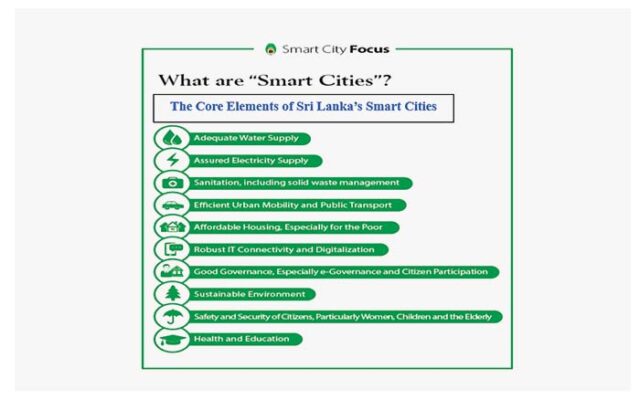by Dr W.G. Somaratne
PhD (Econ), Latrobe, Australia; MSc (Ag.Econ), London;
BA (Econ), First Class, (USJP); Freelance Development Consultant,
Ex-Economist (ADB), (Part Time); Ex-Head and Senior Research Fellow (HARTI); and Visiting Lecturer,
(USJP); Email: wgsomaratne@gmail.com
The digital economy represents a transformative shift in the way businesses, governments, and individuals interact, trade, and create value. For Sri Lanka, this shift towards digitalisation presents a vital opportunity to stimulate economic growth, enhance economic governance, and social inclusion, and improve service delivery across the country. The expansion of digital infrastructure and increasing access to mobile technology and internet services have already paved the way for new economic models, from e-commerce to digital finance and remote work. With a strategic focus on building a resilient digital economy, Sri Lanka can address critical challenges such as unemployment, regional economic disparities, and limited access to global markets, especially for small and medium-sized enterprises (SMEs).
A robust digital economy can empower Sri Lankan citizens, providing access to global markets, financial services, education, and healthcare through advancing new technology by opening opportunities for the general public. It also enables innovation and entrepreneurship development by reducing barriers to entry, encouraging startups, and supporting local industries in becoming globally competitive. However, realizing the full potential of a digital economy requires significant investment in digital infrastructure, improvement in digital literacy, and a regulatory environment that promotes security, trust, and innovation. With the right framework and collaborative efforts, Sri Lanka’s digital economy can play a pivotal role in the nation’s journey towards a sustainable, inclusive, and competitive future on the global stage.
Need for digital economy in Sri Lanka
The transition to a digital economy is critical for Sri Lanka’s development, as it provides avenues for economic growth, social inclusion, and improved governance. By embracing digitalisation, Sri Lanka can modernise traditional agriculture, manufacturing and service sectors, increase competitiveness, and overcome existing economic limitations.
Economic Growth and Employment Creation
Digital tools and platforms can improve productivity across sectors, from agriculture to manufacturing and services, by streamlining processes, enhancing data analysis, and reducing costs. The digital economy offers new avenues for employment in sectors like information technology, e-commerce, fintech, and digital marketing. These jobs can reduce youth unemployment, which remains a challenge in Sri Lanka. Further, digital tools empower SMEs by providing easier access to markets, customers, and resources through e-commerce platforms and social media. This can boost growth in the SME sector, as a vital part of Sri Lanka’s economy. Accordingly, some of the key reasons for the necessity of a digital economy for Sri Lanka’s development are explained below:
Fostering Innovation and Entrepreneurship
Digital platforms enable aspiring entrepreneurs to develop startups with lower initial investments. This fosters a culture of innovation, leading to the creation of unique solutions to local and global challenges. Further, a focus on digital can drive the development of solutions in fintech, health tech, agri-tech, and edu-tech sectors, addressing specific needs in Sri Lanka’s context, like financial inclusion, healthcare access, and agricultural productivity.
Enhancing Global Competitiveness
A digital economy allows Sri Lankan businesses, especially SMEs, to access international markets and access to finance more easily. This can boost exports and promote Sri Lanka as a global supplier of IT and knowledge services. Developing a digital economy demonstrates that Sri Lanka is forward-thinking, which can attract foreign direct investment (FDI) in 4IR technology, telecommunications, and knowledge-based industries including SMEs in the country.
Strengthening Governance and Transparency
Promoting Digital Government Services can be performed, especially, the establishment of a digital economy in Sri Lanka, which enables efficient and transparent government services, reducing bureaucratic hegemonies and delays and corruption in the government institutions. E-governance can improve public service delivery in areas like licensing and taxation in Customs, the Department of Inland Revenue and the Exercise Department, and promote social welfare in the country. Further, the decision-making in government organizations could be improved based on Data-Driven Decision-Making in the country (eg. Digitized Food Storage System). In particular, access to real-time data enables the government to make informed decisions on infrastructure, healthcare, education, and public safety, which can lead to better resource allocation and promote Smart Infrastructure, Smart Health, Smart Education, Smart Security, Smart Agriculture etc.
Facilitating Financial Inclusion: Digital banking, mobile payments, and online financial platforms improve access to banking services, especially in underserved regions. This enables more people to participate in the economy, save money, and invest in their businesses by promoting access to financial services. In addition, it improves the Growth in Fintech. The fintech sector can help provide credit, microfinance, and savings solutions to SME businesses and individuals, especially in rural areas, stimulating economic activity and growth.
Improving Education and Skill Development
The digital literacy level in ri Lanka needs to improve through digital tools and resources, which enhances education by providing access to online courses, resources, and remote learning. This can bridge education gaps and the digital divide, especially in rural areas. In addition, it can promote Skill Development for the Future, particularly, because a digital economy encourages the acquisition of skills in AI, data science, coding, digital marketing, e-business and e-commerce, which are in high demand globally. This improves employability for youth and women and prepares Sri Lanka’s workforce for the global future.
Environmental Sustainability
A digital economy reduces the need for physical infrastructure and travel, which can help minimise carbon emissions. Remote work, for instance, reduces the need for commuting, lowering the demand for fuel, decreasing pollution etc.. Further, digital solutions in areas like agriculture and energy enable more efficient use of resources, such as precision farming techniques that reduce water and pesticide use, contributing to goals of environmental sustainability and Smart Resource Management.
Challenges to Address for a Successful Digital Economy in Sri Lanka
While the benefits of a digital economy are clear, Sri Lanka faces some challenges in realizing this vision:
Digital Literacy Improving digital skills and literacy, particularly in underserved areas, will be essential for widespread adoption to promote the functioning of the digital economy.
Regulatory and Policy Framework: Clear, supportive policies that encourage digital innovation and protect consumer rights are needed to support a digital economy.
Infrastructure Development
Expanding internet access and digital infrastructure, especially in rural areas, is crucial to promote connectivity.
Cybersecurity and Privacy
Ensuring robust cybersecurity and data protection measures is also critical as more services and businesses move online and promote the concept of Smart Cities in the country.
The functions of the proposed new Ministry of Digital Economic Development would be to make decisions regarding the promotion of the digital economy in Sri Lanka and the provision of digital solutions for the development and promotion of digital economic governance and entrepreneurship development in the digital economy. The digital economy will be established by networking with all government institutions in Sri Lanka to promote efficiency in economic governance, which reduces transaction costs, and provides services with efficiency and effectiveness.
In particular, the management of the human capital and digital economy is less effective because many of these functions are not performed with the modern standards to promote efficiency in the human capital operational functions.
Accordingly, malfunctioning of the processes is rampant, no time management, and prolonged delays in service delivery, which denies the gaining of improving human capital in the country. However, the development of both the human capital and digital economy is necessary for operating with maximum efficiency for utilizing the hard-earned taxpayers’ funds. The only solution is establishing a digital economy linking all the government organizations together with the digital network to get rid of financial fraud, malpractices, bribery and corruption by using blockchain technology. For this purpose, Smart Health, Smart Education, Smart Custom, Smart Inland Revenue and Smart Exercise Department are some of the priority projects in the digital economy of Sri Lanka. Establishing and Promoting SMART Cities is also considered a necessary project for attracting investment to link the public and private sectors working together for national development. Eventually, it will assist in increasing government revenue as well.
Digital Economy and Foreign Direct Investment (FDI)
Human capital development refers to the process of enhancing the knowledge, skills, abilities, and overall well-being of individuals, contributing to their personal and professional growth. Intellectual skills, innovation and information technology assist in wealth creation and lead to a knowledge-based economic system for Sri Lanka’s economic transformation. A Digital Economy in the transformed Sri Lanka that maximizes the use of digital technologies sustainably. It has three main scopes (a) Core scope as a Digital (IT/ICT) sector; (b) Narrow scope: Digital Economy; and (c) Broad Scope: Digitalized Economy and Society. The digital economy expects to transform the Sri Lankan economy into a fully pledged digitalized economy to gain advantages in improving economic governance attracting investment with 4IR technology and maximizing the economic and social well-being of the people.
Strategic Framework for Adopting the Digital Economy
The Strategic Framework for establishing and functioning a Digital Economy in Sri Lanka needs to establish 15 ‘Fortune Economic Zones (FEZs)’. Through these proposed FEZs, it is expected to invest in generating employment opportunities for youth and women and foreign income for the country. The proposed 15 digital FEZs are as follows:
Digitalized Economy and Society –
1 Fortune Economic Zone – For Establishing 5 Smart Cities within 3 years (pilot in Kandy and Gampaha and other 3 cities are Colombo, Matara, and Jaffna);
Adopting Smart Governance System:
1 – Fortune Economic Zone, covering E-Government Services for online public service delivery, covering Digital Platforms for citizen engagement and participation.; and Open data initiatives to provide public access to government data. Issuing a Personal Identification Number (PIN) for each citizen of the country is vital to promoting good governance and a corruption-free society. Sri Lanka needs to adopt a zero-tolerance policy for corruption, fraud and malpractices in the country. In addition, by adopting 4IR – blockchain technology in the operation of economically critical sub-sectors like customs, the Department of Inland Revenue and the Exercise Department, the government will be able to assist in maximising the generation of government revenue greatly.
Smart Mobility:
1- Fortune Economic Zone – for Intelligent transportation systems; it includes Real-time traffic management and monitoring; Smart parking solutions, and Public transportation enhancements, covering real-time tracking and scheduling;
Smart Energy –
1 Fortune Economic Zone: for Energy-efficient technologies and infrastructure; including Smart grids for efficient energy distribution; Renewable energy sources (solar, wind, waste) integration and Energy management systems for monitoring and optimizing energy consumption;
Smart Buildings and Infrastructure:
1 Fortune Economic Zone for Energy-efficient and sustainable building designs; Building automation systems for energy conservation; Smart street lighting with sensors for adaptive lighting; and Infrastructure monitoring for maintenance and safety;
Smart Environment:
1 Fortune Economic Zone, for Air and water quality monitoring systems; covering Waste management solutions, including smart bins and recycling programs; Green spaces and urban planning for environmental sustainability;
Smart Healthcare:
1 Fortune Economic Zone; Telemedicine and e-health services; it includes Health monitoring through wearable devices and sensors; Electronic health records and networking for efficient healthcare management in both state and private healthcare institutions/hospitals, Patient registration and management etc.
Smart Education:
1 Fortune Economic Zone for E-learning platforms and digital classrooms; Smart campuses with technology-enhanced learning environments; and Educational analytics for personalized learning;
Smart Security:
1 Fortune Economic Zone for Surveillance systems with video analytics; Emergency response and disaster management systems; and Cybersecurity measures to protect digital infrastructure;
Data Analytics and Artificial Intelligence (AI):
1 Fortune Economic Zone for Big data analytics for extracting valuable insights from vast datasets; AI applications for predictive analysis and decision-making; Machine learning algorithms for optimizing city services (Eg. Stock and Buffer Stock Management Systems in the economy covering both the private and state sectors’ operations).
Internet of Things (IoT):
1 Fortune Economic Zone for Sensor networks and IoT devices for collecting real-time data; and Smart sensors for monitoring and managing various aspects of city life.
Citizen Engagement and Social Innovation:
1 Fortune Economic Zone for Platforms for citizen feedback and participation, and Initiatives promoting social innovation and entrepreneurship development.
Establishing an IT park for attracting FDI
– One Fortune Economic Zone – Silicon Valley IT Park in Malambe;
Establishing an IT park for attracting FDI
– 1 Fortune Economic Zone – Silicon Valley IT Park in Gampaha; and
Establishing an IT Park for attracting FDI
– 1 Fortune Economic Zone – Silicon Valley IT Park in Avissawella
Concluding Remarks
The development of a digital economy is a pathway to sustainable and inclusive growth in Sri Lanka. By operationalising the above strategic interventions, improving economic productivity, increasing financial inclusion, fostering innovation, and enhancing governance, a digital economy could help Sri Lanka meet its development goals and compete globally. With a strategic approach and investment in the necessary IT infrastructure, and skills, and operationalizing the above strategic operational framework with ‘Establishing ‘Fortune Economic Zones’, Sri Lanka can make a successful transition to a thriving digital economy.







